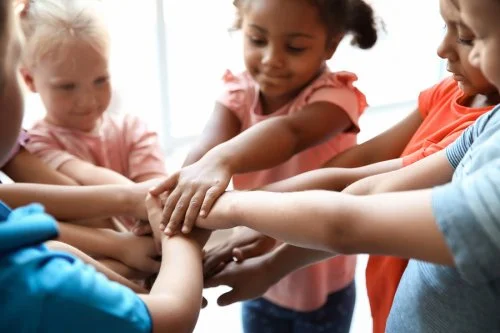Have you noticed that one of the first words little ones learn to say is "mine"? At first, everything seems to be theirs, from a toy to their mom or dad. And that's normal, since it's part of their cognitive and socio-affective development. However, this does not mean that we should not teach children to be supportive, even if they start their lives being selfish, something that has happened to all of us.
We must never forget that we live in society. From birth, we belong to a family, that is, we are already part of a group. From then on, as we develop, things increase, because first we start with nursery school, then with school, with a group of friends or, later on, with belonging to a company, from a work point of view.
Thus, since we are social beings, our happiness will depend on the well-being of the group or groups to which we belong.
Having said this, I would like to add that if we teach our children to be supportive from an early age, they will also be supportive as adults in the future. Therefore, it is worthwhile to invest in education in this important value, both at school and in the family.
Keys to teaching children to be supportive
The family environment is ideal for training children in values such as solidarity. Let's take a look at some tips that can be useful in this regard.
Be an example for your children
If children see their elders acting in solidarity, being generous and kind, they will imitate their behavior. Let us remember the importance of vicarious learning in childhood, since they learn a lot by imitation.
Insistence on sharing
We must be very persistent at this stage. When the child believes that everything is his, we must be there to teach him the importance of sharing his toys and possessions.
We have to act with remarkable perseverance to get children to want to leave their objects to other children. It's not easy, but as they get older, we will see them develop into more generous and caring little people.
Enjoy giving as a gift
Another useful task that allows children to be more supportive is giving gifts. If we get them used to being an active part of the family from an early age, making decisions in areas as interesting as giving presents to other children, we will see how they will gradually enjoy giving gifts.
A child who has a good time choosing a detail for a friend or family member, and by participating in it, tends to develop into a more caring person, as he or she is aware of the joy this awakens in others, while making the child himself or herself feel good.
These details do not have to be only with other children. It could also be done with adults and even with pets. Let the children be in charge of feeding them, watering them or giving them a reward and, in short, to be concerned about the welfare of others.
Insistent conversations
Persistence and patience will be great allies in the correct upbringing of a child. That is why we must be very insistent in conversations with the little ones, explaining and demonstrating why a value such as solidarity is so important. If we give up and do not persevere, this information will be diluted among the thousands of thoughts that pass through the minds of the little ones every day and will be of no use.
If you want to know more about how to teach children to be more supportive, don't forget to count on the specialists of Logos Nursery SchoolWe are ready and excited to help you in the development of your children in that first and wonderful stage of their early growth.

